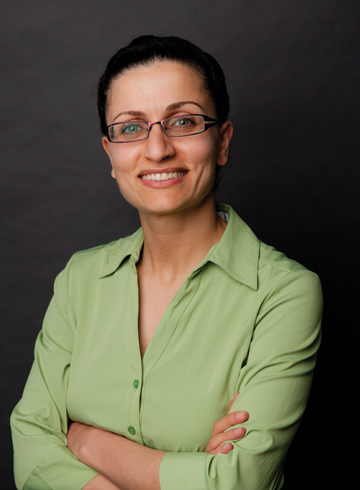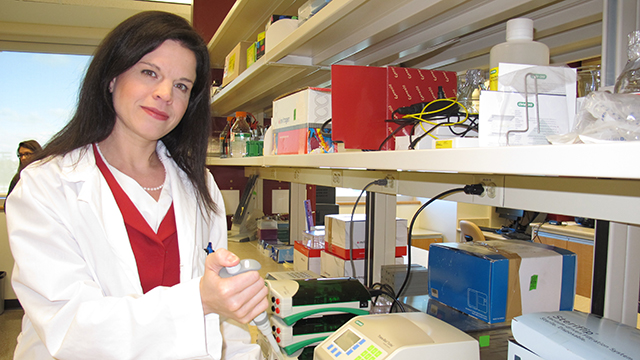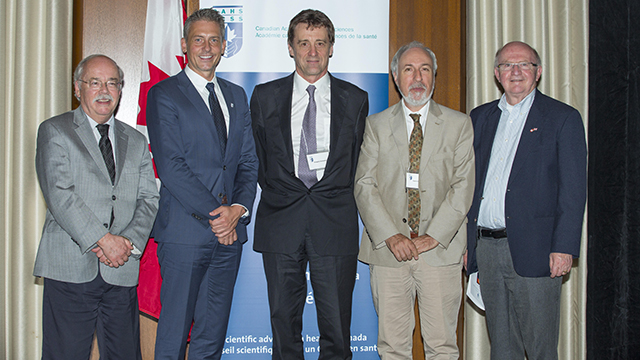
Dr. Zamaneh Kassiri
Zam Kassiri and Lynne Postovit have been elected as New Scholars to the Royal Society of Canada's College of New Scholars, Artists and Scientists for their outstanding contributions to health research. Their memberships will be officially instated during the Royal Society of Canada's Annual Meeting in Kingston, Ontario in November. The College is an interdisciplinary entity which recognizes Canada's top young scientists and intellectual leaders.
Jason Dyck, David Westaway and Douglas Zochodne were celebrated for their outstanding academic achievements with fellowships from The Canadian Academy of Health Sciences (CAHS). The honours were officially presented at the CAHS annual meeting on September 15 and16, 2016 in Montreal. The CAHS works in partnership with the Royal Society of Canada to recognize and represent key issues in the health sciences at the national and International levels.
Learn more about these accomplished scientists below.
Royal Society of Canada College of New Scholars, Artists and Scientists
Dr. Zamaneh Kassiri, Department of Physiology
Cardiovascular Research Centre
Kassiri was nominated by her colleagues along with an internal peer-review competition made up of Royal Society Fellows and Members of the College. Her nomination is doubly exciting as it reflects the high opinion of her University of Alberta colleagues, as well as her favourable impression with Canada's senior scholars. This came as a pleasant surprise for Kassiri.
Research focus: Cardiac & Vascular Remodeling-the changes that occur in the structure of the heart, arteries and veins due to heart or vascular diseases.
Kassiri's work focuses on understanding how cellular behaviour can be manipulated in order to develop new therapies for heart disease.
The seed for her work was planted in Toronto, where she did undergraduate and graduate work to learn about changes in cardiac tissue in the presence of cancer. She then spent five years at the Ontario Cancer Institute, where she applied her knowledge of cancer cells to the cardiac field. Her current research program in cardiac and vascular remodeling was developed based on the findings of her graduate work.
Future goals: Kassiri hopes to see her research through from bench to bedside, so it can directly impact patient care.
"If I can see the results being applied to humans within my career lifetime, that's my ultimate goal. That's when you know you've actually contributed. It's nice and exciting when we have findings in lab and cell models, but when you're able to help patients, that's what it's all about."
Kassiri also notes that working with her team has made her experience in Edmonton especially rewarding. "It's a lot less crowded, and there is a different level of collegiality among the faculty, which you don't see in the very large universities...It's a collaborative, collegial environment and it's been great."
Lynne Postovit, Department of Oncology

Cancer Research Institute of Northern Alberta
Research focus: Cancer Plasticity -- how the environmental conditions of the body affect the behaviour of cancer cells, especially in some breast cancers.
Postovit's current research looks at the ways stress promotes resistance to therapy, cancer recurrence and abnormal cell growth. The discoveries from this research may lead to the development of new cancer therapies.
Future goals: Postovit views her appointment in the College as an opportunity to build trust with the public, while addressing myths and misconceptions about cancer treatment.
"I think it's a chance to work with other like-minded academics...to help inform decisions. We're in an era right now where there's a questioning of our fact-based society, and I think we as academics have to work very hard to re-engage the public into educating them on the differences between fact and fiction."
She plans to advocate for discovery research, and to be a role model for women in scientific fields. "I'm a scientist but I'm also a mother. And all the things that have to be balanced and how that actually changes your life...I want to advocate for that and show that it's possible."
Fellows of the Canadian Academy of Health Sciences

Dr. Jason Dyck, Department of Pediatrics
Cardiovascular Research Centre
Research focus: Cardiac Energy Metabolism-how the body converts fuel to energy, and how this process is affected by the presence of disease.
Dyck's work has improved the understanding of metabolic diseases such as atherosclerosis, obesity and diabetes.
Future goals: "It's a great opportunity to have a seat at the table, and to have an impact on health science decision making at the government level."
Dyck sees his achievements as part of a larger collaborative effort, noting that he wouldn't be where he is today without the collegiality and support of the Faculty of Medicine & Dentistry.
Dr. David Westaway, Department of Neurology
Centre for Prions and Protein Folding Diseases
Research focus: Neurodegenerative Disease.
Westaway's lab seeks to find the earliest events that trigger brain diseases like Alzheimer's. "We believe there is much to be understood about how our environment and diet affect the 3D shape of important molecules in our brain cells." This work has significantly impacted the overall understanding of Alzheimer's and other neurodegenerative diseases.
Future goals: Westaway says his CAHS induction is a great honour, and views it as an opportunity to anticipate issues related to the rapidly aging population in Canada. "Being inducted into the CAHS places our work in the larger context of the dementia tsunami breaking over our health care system."
Douglas Zochodne, Department of Neurology
Neuroscience and Mental Health Institute, Alberta Diabetes Institute
Research focus: Peripheral Nerves-the critical connections between the brain, spinal cord, and the rest of the body.
Diabetes patients are especially vulnerable to peripheral nerve disorders, which can have a spectrum of outcomes from loss of sensation to amputation. Zochodne hopes to find ways for damaged nerve cells to regenerate after diabetes and other peripheral nerve injuries.
Future goals: Like his colleagues, Zochodne views his new appointment as an opportunity to advocate the government about the importance of fundamental research.
"Fundamental lab work is absolutely critical. In the past 30 years many clinical trials have been conducted, but they haven't worked due to a lack of basic understanding of how diabetes works at the cellular level," he says. "Fundamental science is critical for new discoveries and developing new treatments for diabetes."